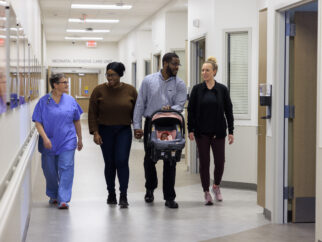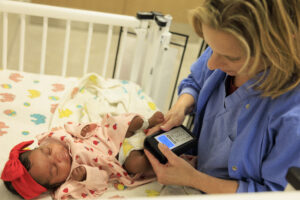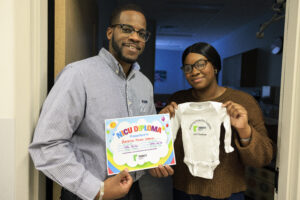The bond between a mother and a baby begins to develop well before birth. After giving birth, the development of skin-to-skin contact with the newborn only intensifies that bond. Furthermore, healthy breastfeeding and lactation not only continue to strengthen that bond, but also paves the way for a happy and healthy baby, should that be the feeding choice the mother decides to go with.
For many, this can be an exciting yet nerve-racking time as they might not have any experience with breastfeeding or might not know someone who does. However, at the Family Birth Center, Trinity Health has specially trained lactation consultants and counselors who are there to help while a patient is in the hospital and when they go home to make sure they have the smoothest transition possible.
But before the patient arrives at the hospital there are resources available, such as various educational classes on breastfeeding and motherhood to help make the mother as prepared as they can be for this exciting milestone in their life. Trinity Health offers these classes for their patients free of charge.
Trinity’s Breastfeeding Basics class gives an opportunity for attendees to learn all things breastfeeding. It’s encouraged that the class is attended prior to delivery, but this class also is available to women who have recently delivered.
Prepared Childbirth classes are offered monthly and should only be attended during the last eight weeks of pregnancy. Each session provides valuable information regarding what to expect in labor. Topics gone over during class include comfort measures, options for pain relief and early postpartum cares.
Trinity’s Basics of Baby Care class covers the basics of newborn care like feeding, bathing, diapering, soothing and sleep. This class is available to expectant or parents of newborns. Trinity Health also offers a class for siblings. This hands-on class is geared toward ages 2 and up and will go over topics such as baby safety, how to help and some changes that may occur.
Even though these resources are free and available for expecting mothers to use, life gets busy, and people might not be able to attend. The staff at Trinity Health’s Family Birth Center will make sure mothers who decide to breastfeed, as well as those who don’t, are well prepared and equipped with the knowledge to have a healthy transition to life at home.
“We visit with each of our patients and make sure, whether they are breastfeeding or bottle feeding, that their feedings are going well, and they are prepared to continue whichever relationship they have with their baby going forward when they head home,” said Amanda Bekkedahl, RN, and International Board-Certified Lactation Consultant (IBCLC) with Trinity Health.
During those visits, the lactation consultants and counselors assist in helping patients navigate the process of feeding the newborn, which is not limited to but includes: assistance and support with latching the infant to the breast, education on and promotion of skin-to-skin bonding with the infant, education regarding the use of breast pumps, assessment of the need for breastfeeding assistive devices, referrals for lactation follow-up visits to the clinic and post-discharge follow-up phone calls.
Upon heading home, it’s a different world as the mothers adapt to life with a new baby. Even though they receive plenty of information and support regarding breastfeeding, once they are on their own it can be a little intimidating. Bekkedahl believes that practice and willingness to learn can help ease that transition.
“The tricky thing about breastfeeding is that it’s the most natural thing, so people expect it to be easy. The first two weeks, especially with their first baby, are not that easy. It takes a lot of learning and practice on getting the baby positioned right and latched correctly.”
Bekkedahl added, “It’s common for people to think they have to tough through it and that blisters or pain they experience are normal, but it’s not…In general, it’s important to understand that it doesn’t have to be painful or super hard and to know there are things that we can do to help.”
In addition to the pain and blisters, mothers should also be aware of bruising and bleeding that can result from a shallow latch or incorrect position. Getting the baby latched deeply to the breast is not only important to the mother, but it’s also beneficial to the baby to make sure that they are getting enough milk and transferring it efficiently.
Proper latching and healthy breastfeeding can lead to many benefits for both the baby and the mother. According to Bekkedahl, moms can have less occurrences of postpartum depression and anxiety and be at less of a risk for heart disease, certain cancers and diabetes. For the babies, the main benefit is less of a risk for sudden infant death syndrome (SIDS), less occurrences of upper respiratory tract infections, less risk for ear infections, then later in life they are at less of a risk for diabetes and heart disease.
While there are plenty of resources available during time spent at the Family Birth Center, the support for the babies and mothers does not stop once they head home and get used to their new life together. Should someone struggle with breastfeeding or have questions regarding that process, there are still resources available and people willing to provide help.
Wendy Strietzel, RN, a certified lactation counselor with Trinity Health, is one of the nurses on the pediatric clinic side who can help during those situations. “Some of the many ways I help mothers are when they are having issues with breastfeeding whether it’s a bad latch, low milk supply, concerns about mastitis and things like that. I help them work into a better latch or find a solution based on their needs,” Strietzel said.
Strietzel added, “we also do pre- and post-feeding weights if they are worried about the baby not getting enough milk from mom, just to reassure them that the baby is transferring milk well. If they are not transferring well, we can work on ways to get the baby to transfer milk better and if needed how they can supplement the baby in a way that won’t interfere with breastfeeding. Also, if they are having any issues with sore nipples, I can give them advice on what they can use to heal their nipples on their own.”
Echoing the same sentiment as Bekkedahl, Strietzel believes it’s a common misconception that sore nipples are a normal part of breastfeeding, and that people sometimes wait too long to get help. “We want to work with them and make sure they get help sooner than later so we can prolong that breastfeeding journey. A lot of times, people will quit because of the soreness they have to deal with.”
When new mothers come in for their first baby appointment and mention to their doctor or nurse that they are having breastfeeding issues, that is when the opportunity to work with Strietzel and those in the clinic arises. However, appointments can also be made over the phone and contact doesn’t have to wait to be made at the time of the baby’s first appointment.
Between the educational classes, visits and time spent at the Family Birth Center and the pediatric clinic appointments, there are ample resources provided by Trinity Health to make sure families have a successful transition back to their home life with a newborn now in the picture.
The helpful resources, however, don’t have to strictly come from Trinity Health. One of the biggest resources someone can provide to a new mother is support, as well as a few other things.
“Following a healthy diet and making sure that you are getting enough nutrients, and then also just preparing. At our Breastfeeding Basics class, we are so excited when we have a full class and people come because the breastfeeding relationship depends on support from your significant other, your family, your friends, our community and just preparing yourselves as best as you can” Bekkedahl said.
Bekkedahl added, “it’s going to help mothers feel more comfortable with the idea of what to expect before their baby even gets here. Then once the baby arrives, parents will have the confidence to implement what they have already learned.”
This year, the remaining class dates for Breastfeeding Basics are September 4, October 2, November 6 and December 4 from 6 to 8 p.m. Prepared Childbirth classes will take place on September 7, October 5, November 2 and December 14 from 9 a.m. to 4 p.m. Basics of Baby Care will be on September 9, October 7, November 4 and December 16 from 6 to 8 p.m. Sibling Class will take place on September 3, October 1, November 3 and December 3 from 4 to 6 p.m. All classes take place at Trinity Health Hospital Prairie Rose Conference Room 3. For more information, please call 701-418-8806 or toll free 1-800-862-0005.





